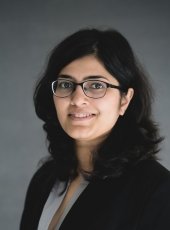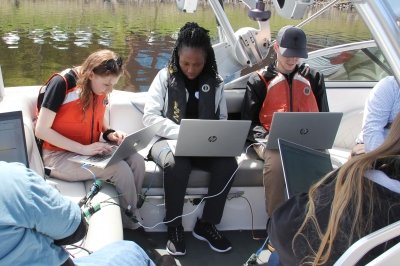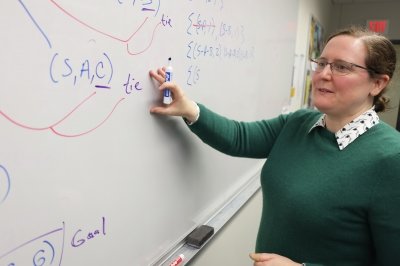Advanced sensor technologies, growth in the amount and availability of sensor data, new computational methods, and greater computational power offer fresh approaches to understand and address the complex environmental challenges posed by climate change.
To help prepare tomorrow's data scientists to effectively employ these tools, Michigan Tech has been awarded a prestigious National Science Foundation (NSF) Research Traineeship (NRT) grant titled "Integrative Training in Data Science-Enabled Sensing of the Environment for Climate Adaptation (DataSENSE)."
The five-year, $700,000 NRT DataSENSE project will deliver training, research, and mentoring experiences to as many as 15 Michigan Tech doctoral students from academic departments across campus, preparing them to analyze and interpret climate-adaptation-related problems using cutting-edge, data science-intensive tools. Participating students receive support covering the first five semesters of their doctoral studies: one full year plus fall and spring of the next year.
"The NRT grant recognizes that Michigan Tech has all of the required pieces to provide students with this type of training," says Laura Brown, associate professor of computer science and the project's principal investigator. "It allows us to connect these pieces into a holistic student experience. Future leaders will need transdisciplinary training like this."
Participating PhD Programs
- Atmospheric Sciences
- Computational Science and Engineering
- Computer Science
- Environmental Engineering
- Forest Science
- Geological Engineering
- Geology
Principal Investigator
- Laura Brown, Associate Professor, Department of Computer Science
Co-PIs
- Dukka KC, Professor, Department of Computer Science
- Thomas Oommen, Professor, Department of Geological and Mining Engineering and Sciences
- Shiliang Wu, Professor, Department of Geological and Mining Engineering and Sciences
Senior Personnel
- Tao Liu, Assistant Professor, College of Forest Resources and Environmental Science
- Sidike Paheding, Fairfield University
- Ashraf Saleem, Assistant Professor, Department of Applied Computing
Faculty from three colleges and six PhD programs will mentor DataSENSE trainees, sharing their expertise in data science, machine learning, computer vision, geological engineering, environmental engineering, sensing technology, atmospheric science, and forestry science.
"We want to engage doctoral students in fantastic research opportunities and mentor them so they can become self-confident experts with a portfolio of essential computational skills and sensors and application knowledge," says Brown.
The NRT project began in March 2023. During its first year, the faculty investigators have focused on student recruitment to build a diverse PhD trainee pool. They are also developing courses and activities that support professional development and student retention. NRT activities will include seminar series, symposia, workshops, faculty and peer mentoring, and career development training. Many of these opportunities will also be available to students who are not part of the NRT program.
Dennis Livesay, Dave House Dean of Computing, says the award represents the growing importance of computing-centered efforts to Michigan Tech's research mission.
"Doctoral education in today's world is about providing students with opportunities to contribute to society, wherever they see fit—in the academy, in industry, as entrepreneurs, in government," says Will Cantrell, associate provost for graduate education and dean of the Graduate School. "The NRT experience enhances Michigan Tech's ability to do just that."
Prospective, new, and current Michigan Tech doctoral students are invited to apply for the NRT traineeship.
Laura Brown: Always Learning and Collaborating
When Laura Brown was a graduate student, data science wasn't yet a separate discipline; it was spread throughout many areas. As data science started to develop as a distinct academic subject area, she became very interested in it and the artificial intelligence, machine learning, and computational aspects of computer science.
"Data science can be applied to so many types of problems in so many areas. This is something that I really enjoy about what I do," says Brown, now an associate professor of computer science at Michigan Tech.
Brown's research interests focus on both theoretical data science topics and the application of data science techniques to other domains. She works with faculty across campus and at other universities, including experts in biology, forestry, chemistry and chemical engineering, and social sciences.
Brown is associate dean for data science initiatives in the College of Computing and also directs MTU's bachelor's and master's degree programs in data science. She is a member of two Michigan Tech research centers: the Institute of Computing and Cybersystems (ICC) and the Center for Agile Interconnected Microgrids (AIM).
"There's always an opportunity to collaborate, and I'm always learning about new things and working with fantastic collaborators."
Undergrad Profile: Felicia Huffman, Data Science
Junior undergraduate Felicia Huffman, from Jackson, Michigan, has had a passion for math since the fifth grade, so it was important to her to find a career where she could apply it.
"I did some research and discovered data science," she says. "It provides a great salary, a strong job outlook, and an opportunity for me to be challenged. These factors, along with my computer science experience, are why I chose data science."

Huffman toured Michigan Tech as a high school student and loved it. "It was during Winter Carnival. There was snow everywhere, and I was surrounded by amazing ice sculptures. I love all the activities you can do in the snow, like skiing, snowmobiling, and snowball fights."
After Huffman participated in a data science-focused exploration through MTU's Summer Youth Programs, she decided that Michigan Tech was where she wanted to be. "I got along with the other people at the camp better than I have with anyone," she says. "I connected with Dr. (Laura) Brown to confirm that the data science BS program was coming, and now here I am today."
Huffman is enjoying being a part of the new program, launched by the College of Computing in fall 2023 under Brown's direction.
Huffman isn't yet sure where she wants to take her career, but she hopes to pursue work that helps people, potentially as a healthcare data scientist. "Data science is still such a broad category. If I had to choose now, I would say the artificial intelligence and machine learning side interests me the most," she says. "It's fascinating to me how data can drive a machine, and how, if that data is biased, it can significantly affect the machine's practicality."
Along with her bachelor's degree studies, Huffman is planning to complete an accelerated master's in data science. She hopes to graduate in fall 2027.
"I feel like we have a lot of flexibility and we also get to help create the path for future students. It makes it feel more interactive, rather than the professor doing most of the work."
Graduate Student Profile: Pradnya Pendse, Data Science
Pradnya Pendse began her graduate studies in data science at Michigan Tech in fall 2022 after working in the automotive and manufacturing industry for four years. She earned her bachelor's degree in computer science and engineering in 2018 from Shivaji University in Kolhapur, Maharashtra, India.
"As a computer science bachelor's degree graduate with work experience as a data analyst and engineer, I decided to study data science," says Pendse.

Pendse's interest in Michigan Tech was spurred by the University's work in the manufacturing and automotive domains. "The combination of well-rounded technical coursework in data science and the prospect of engaging in innovative research projects made MTU an appealing choice for me," she says.
"The well-structured courses at Michigan Tech offer an excellent balance between technical and functional domains," says Pendse. "The project-driven approach to learning not only enhances theoretical understanding, it provides opportunities to implement learning in real-time projects, fostering practical skills and application."
Pendse is particularly interested in the application of data science in the automotive industry. "What excites me the most is the prospect of using advanced analytics and machine learning to derive insights from complex datasets in manufacturing and automotive processes," she says. "I see the potential for impactful innovations and improvements in efficiency, quality, and decision-making within this industry."
"I see data science as the next logical step in my career, offering the opportunity to solve complex problems and contribute to informed decision-making through advanced analytical methods."
At the 2023 IEEE ASEE Frontiers in Education Conference (FIE), Pendse presented her research paper, "Work-In-Progress: Python Code Critiquer, A Machine Learning Approach." She says the collaborative research described in the paper develops a system that automatically detects coding mistakes made by students in programming classes and provides immediate feedback to improve student learning outcomes and coding skills.
The work is funded by a research and development grant from the National Science Foundation; Assistant Professor Leo Ureel of the Department of Computer Science is the principal investigator. Pendse also presented this research at the 2003 First Year Engineering Experience Conference (FYEE).
In spring 2024, Pendse is completing a co-op as a data engineer in the SML Operations department of the Volvo Group, a major producer of trucks, buses, construction equipment, and marine and industrial engines. In summer 2023, she worked as an advanced analytics intern with Driven Brands, the parent company of some of North America's leading automotive services. Her primary focus there was developing a comprehensive time series model from the ground up, which encompassed meticulous data preprocessing and the application of sophisticated feature selection techniques.
"One of the most interesting parts of my internship at Driven Brands was building a strong model to predict how things change over time," she says. "To do this, I applied my analytical and statistical skills to make very accurate predictions. I also worked with models that consider multiple factors to get a better understanding of how things are connected."
Pendse expects to graduate with her Master of Science in Data Science this spring. She plans to restart her career in the manufacturing and automotive industry as a data engineer or data scientist.
"While I am sad to close this chapter of my career, I couldn't be more excited for the next."
BS in Data Science Welcomes First Cohort
Organizations of all sizes and types are using data to drive decision-making, improve business processes, design and develop new products, and market their products. And the volume, availability, and potential uses for data are increasing exponentially.
As a result, data science is a rapidly growing occupational opportunity. The US Bureau of Labor Statistics identifies data science as one of the fastest-growing job sectors in the US, projecting 35 percent growth and the creation of nearly 60,000 new jobs through 2023. The 2022 median pay of data scientists was $103,500.

In response to these growing employment opportunities, the College of Computing has launched a Bachelor of Science in Data Science, which began accepting students in fall 2023. Laura Brown is the director of the new program.
The program delivers a broadbased education in data science fundamentals, data mining, predictive analytics, communication, and ethics. Students gain a competitive edge through a technical focus area in software engineering, cybersecurity, statistics, or business technology. Students also have the freedom to explore and develop their own interests in one or more domains. Graduates of the program are well-positioned to pursue master's degrees.
"Our first cohort of students is really excited to be learning about data science. There's such a need for these skills. I'm looking forward to creating new classes and degree pathways so we can deliver the knowledge and experience our students will need as they begin their data science careers."
MS in Data Science Has New Home
Michigan Tech's interdisciplinary MS in Data Science, established in 2013, found a permanent home in the College of Computing in fall 2023, moving from its former administrative home in the Graduate School. Laura Brown directs the graduate program.
"Continuing to grow our presence in artificial intelligence, machine learning, and data science is one of my biggest priorities," adds Livesay. "We'll continue to work closely with our colleagues across campus, especially business and math, to ensure that all aspects of data science are represented."
The data science master's program is extremely flexible, allowing students to concentrate on a specific area of interest. "If a student is more interested in the business side of data science, they can focus there. Or, if they wish to focus on the machine learning or statistics side, they can do that," says Brown. And even though the degree is a course-based program, students who wish to can pursue research with a faculty mentor.
"We have accepted the responsibility to grow the program, which is a tremendous opportunity that should benefit both the University and our students."
Michigan Technological University is an R1 public research university founded in 1885 in Houghton, and is home to nearly 7,500 students from more than 60 countries around the world. Consistently ranked among the best universities in the country for return on investment, Michigan's flagship technological university offers more than 120 undergraduate and graduate degree programs in science and technology, engineering, computing, forestry, business, health professions, humanities, mathematics, social sciences, and the arts. The rural campus is situated just miles from Lake Superior in Michigan's Upper Peninsula, offering year-round opportunities for outdoor adventure.






